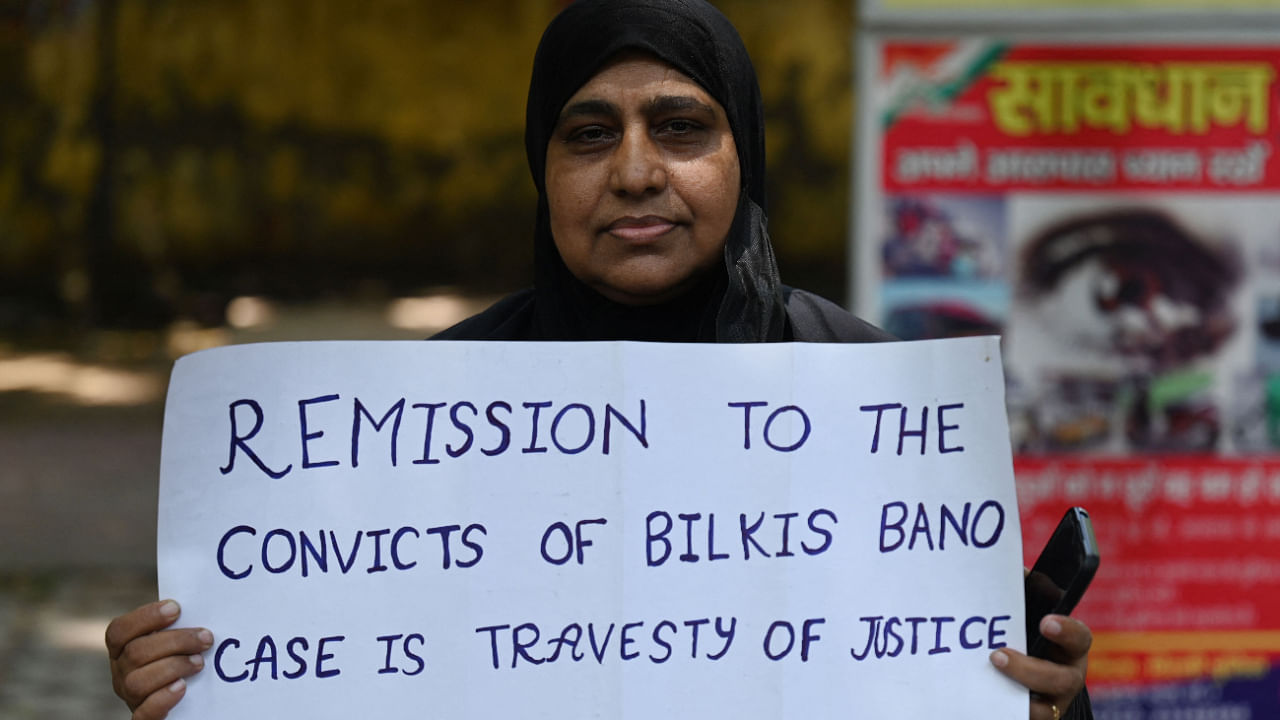
The 11 convicts in the Bilkis Bano case who were released from life imprisonment on August 15 this year based on a 1992 policy had been frequently out on parole before their release and had used their time out of prison to threaten witnesses in the case, a new report reveals.
According to a report by the Indian Express, while the bail pleas of the 11 convicts were rejected every now and then, they still enjoyed a considerable number of parole leaves prior to their release.
To illustrate, in April this year, Radheshyam Shah, one of the accused in the gang-rape and murder case, had filed a plea with the Gujarat High Court for a 28-day parole leave for a “house warming ceremony.” Shah’s plea, however, was rejected, with the HC observing that he had already spent 60 days on parole from January to March this year.
Earlier, in September 2011, when the case was being heard by the Bombay High Court, Shah had sought a temporary three-month bail for his “mother’s knee replacement surgery.” That petition too was rejected by the Bombay HC, which noted that Shah had been “released on furlough in December 2010 and is due to be released on furlough leave in December 2011.
Shah’s co-convict Keshar Vohania had similarly sought parole for his son’s marriage in 2019, but the Gujarat HC had rejected the same, saying since “he has already enjoyed parole leave for 50 days from August 12, 2018 to September 30, 2018, and for 40 days from February 10, 2019 to March 23, 2019, this leave application cannot be entertained.”
Despite HCs rejecting the aforementioned bail or parole applications, some of the accused in the case spent a considerable amount of time outside prison on parole, time which witnesses allege was spent attending political events, fulfilling personal obligations, and issuing threats.
According to the IE report, witnesses and residents of the Randhikpur village, to which both the victims and the convicts in the Bilkis Bano case belong, had submitted several memoranda and complaints to district authorities between 2017 and 2020, asserting that the convicts were “frequently out on parole” and “issuing threats” to the witnesses in the case.
One such complaint from February 2021 — a letter written to then Gujarat Minister for State for Home, Pradeepsinh Jadeja, by Randhikpur resident Abdul Razzak Mansuri on behalf of the witnesses — had alleged that the accused were “using their time out of jail to attend political events, continue with their businesses, build their bungalows and also threaten witnesses,” adding that witnesses in the Bilkis Bano case were living “in constant fear of the accused, (who) are technically serving their life imprisonment.”
Mansuri, in his letter, had referred to the case of Shailesh Bhatt, the fourth accused in the Bilkis Bano case, alleging that Bhatt “had attended an event of the Bharatiya Janata Party and shared the dais with elected representatives of the BJP from Dahod” while out on parole. Jadeja, however, told IE that he had no recollection of receiving such a letter.
Similarly, another witness, Phiroz Ghanchi alias Pintu, on June 23, 2020, had written to the Panchmahal Range Inspector General’s office, alleging that the accused were “using false and pretentious” reasons to apply for parole, and were spending “more time in the village than in jail… and continue to threaten and harass victims in the riots cases, particularly the Bilkis Bano case.”
Also Read | Bilkis case: Three Muslim MLAs request President to revoke Gujarat decision to release 11 convicts
Phiroz had also filed an RTI application with the Godhra sub-jail, where the accused were lodged, seeking details about the parole leaves and furlough granted to them. That application, however, was rejected, with the jail’s Public Information Officer contending that the information sought was “third party information” and could not be released “without consent” of the convicts.
Mansuri and Phiroz weren’t the only ones to file such complaints. In 2017, two other witnesses, Adam Ghanchi and Imtiyaz Ghanchi, wrote to the Superintendent of Police, Dahod, alleging that the family members of Shah and Vohania had threatened to kill them. The witnesses alleged that the convicts were “vengeful and repeatedly (issued) death threats stating that it would not matter if they killed us because they have already been convicted in the (Bilkis Bano) case… They have been out on parole often and (are) threatening everyone.”
A year later, 16 witnesses in the Bilkis Bano case submitted a memorandum to the Dahod Collector, alleging that officials of the Randhikpur police station had been pressuring them to “record statements in favour of the accused.” The letter had also sought 24-hour witness protection measures.
One of the convicts in the case, Ramesh Chandana, told IE that the witnesses’ allegations were untrue, saying, “We never threatened them. Our family members would come to court sometimes to see us. What can we do if they (witnesses) see that as a threat?”
However, witnesses told the publication that none of their individual complaints had been attended to: “We followed up for a few days but since no department was responding to our applications, we stopped pleading,” one witness said.